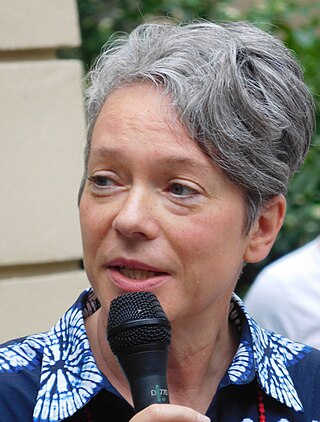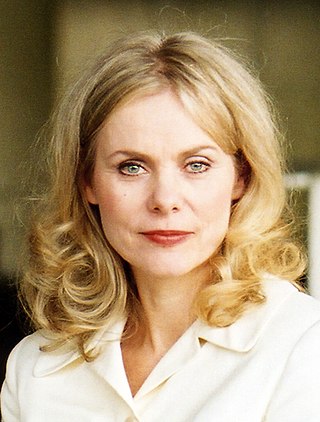
Judith Hermann is a German author. She has published several books of short stories and her first novel was published in 2014. She is a leading figure of the Fräuleinwunder group of women writers.

Mathias Döpfner is a German businessman, author, art collector, and journalist. He is the CEO and 22% owner of media group Axel Springer SE. From 2016 to 2022 he was president of the Federal Association of Digital Publishers and Newspaper Publishers (BDZV).

Theo Sommer was a German newspaper editor and intellectual. He began working for Die Zeit in 1958, rising to an editor-in-chief and publisher. His editorials for Die Zeit shaped the paper's social-liberal attitude. He advocated the policy of détente with the Eastern bloc states (Entspannungspolitik). From 1992, Sommer was publisher of Die Zeit, together with Marion Dönhoff and Helmut Schmidt. He was considered one of Germany's authorities on international relations and strategic issues.

Daniela Dahn is a German writer, journalist and essayist. Since the reunification of Germany in 1990, Dahn has been an outspoken critic of the reunification process. Her highly personal style of writing, and her strident political opinions, have stirred controversy within Germany, but Dahn, who considered herself a dissident within East Germany before 1989, advocates for a critical journalism that continues the democratic tradition of challenging the government and policies of reunified Germany.

Saralisa Volm is a German actress, famous, among other things for her starring role in Finale, a film by Klaus Lemke. Volm grew up in Freising, where she also went to high school. Part of her schooling was at the Gabriel-von-Seidl-Gymnasium Bad Tölz.
The Axel-Springer-Preis is an annually awarded prize. The Award is given to young journalists in the categories print, TV, radio, and online journalism due to the decisions of the Axel-Springer-Akademie.

Dunja Hayali is a German journalist and television presenter for public broadcaster ZDF. She has an interest in sports, and is also known for her social activism.

Carolin Emcke is a German author and journalist who worked for Der Spiegel from 1998 to 2006, often writing from areas of conflicts. From 2007 to 2014, she worked as an international reporter for Die Zeit. Her book Echoes of Violence – Letters from a War Reporter was published in 2007 at Princeton University Press. In 2008, she published Stumme Gewalt, in 2013 How We Desire, in 2016 Against Hate, and in 2019 Yes means yes and.... Carolin Emcke was honoured with several awards such as the Friedenspreis des Deutschen Buchhandels in 2016, and a Verdienstorden der Bundesrepublik Deutschland in 2017.

Ina Hartwig is a German writer, literature critic and academic lecturer. From July 2016, she has been Kulturdezernentin in Frankfurt, the city councillor responsible for culture and science.

Tina Hassel is a German broadcast journalist. Since July 2015 she has been director of the capital studio of ARD, the German public broadcasting association.

Kirsten Harms is a German theatre director and manager.
Claus-Erich Boetzkes is a German journalist and television moderator.

Annette Dittert is a German author, filmmaker, correspondent, and journalist.
Free Media Awards is the press prizes awarded by the two foundations The Fritt Ord Foundation and the ZEIT-Stiftung.

Ursula März is a German author and literary critic-commentator.

Peter Merseburger was a German journalist and author. After working for newspapers and the magazine Der Spiegel, he moved to the broadcaster Norddeutscher Rundfunk (NDR) in 1965. He became known as television presenter of the political magazine Panorama that he moderated from 1967 to 1975, presenting controversial themes. From 1977, he was correspondent of the ARD in several capital cities such as Washington, D.C., East Berlin and London. After retirement in 1991, he turned to writing biographies of influential persons including Kurt Schumacher, Willy Brandt, Rudolf Augstein, and Theodor Heuss.
Paul Ronzheimer is a German journalist and author and serves as the Deputy Editor-in-Chief and a war and crisis correspondent for Bild. Additionally, he is the cross-brand journalistic face for Axel Springer, reporting for various outlets including Welt TV and Politico in addition to BILD. Since August 2023, he hosts a podcast titled "RONZHEIMER.", where he discusses his work, particularly in crisis zones such as Ukraine and Israel, and engages in discussions with prominent guests from politics and journalism about global issues.
Nina Grunenberg was a German author and prize-winning journalist. Beginning her career in West Germany during the 1950s and '60s, when political journalism was largely a male prerogative, she wrote reports on social life in her country. Among others, she covered German political, social and economic affairs, also focusing frequently on science and education and writing about German elites in industry, trade unions and politics.

Ann-Katrin Müller is a German journalist, and the political editor of Der Spiegel. She received an AxelSpringer Prize in Silver in 2018.

Andrea Böhm is a German prize-winning journalist and author. She is mainly known for her reports, essays and books in German about political affairs and society in the United States, the Near East and Sub-Saharan Africa.















